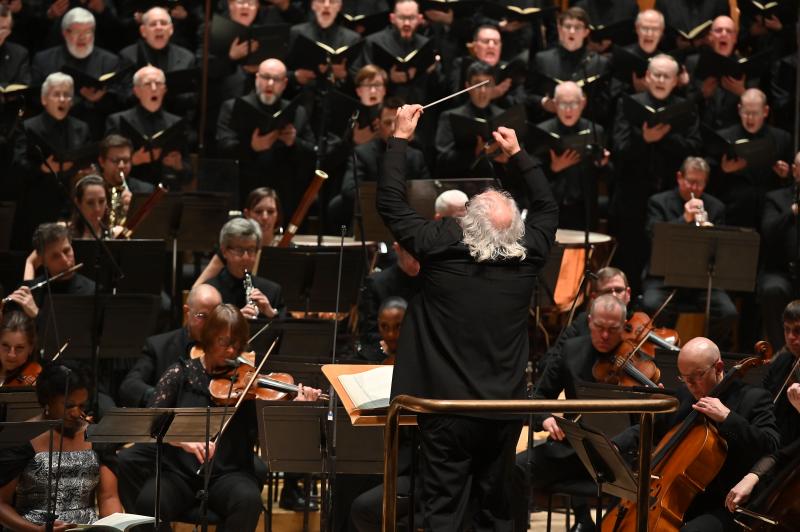 United Kingdom Beethoven: Elizabeth Llewellyn (soprano), Christine Rice (mezzo-soprano), Thomas Atkins (tenor), Roderick Williams (baritone), BBC Symphony Chorus and Orchestra / Donald Runnicles (conductor). Barbican Hall, 4.3.2020. (AK)
United Kingdom Beethoven: Elizabeth Llewellyn (soprano), Christine Rice (mezzo-soprano), Thomas Atkins (tenor), Roderick Williams (baritone), BBC Symphony Chorus and Orchestra / Donald Runnicles (conductor). Barbican Hall, 4.3.2020. (AK)

Beethoven – Mass in D major (Missa solemnis)
With large forces and superb technical skills needed for its performance, furthermore with its continual shifts in dynamics, tempi and mood, the performance of Beethoven’s Missa solemnis is hugely demanding.
All components were in place for this BBC presentation of Beethoven’s late masterpiece although with one unscheduled compromise. Bass Brindley Sherratt had to withdraw, and baritone Roderick Williams saved the day, literally on the day.
Williams is such an outstanding and intelligent artist that I would not be surprised if he actually sight-read the solo bass part. I hasten to add that his singing did not sound like sight-singing. On the contrary; his was a highly accomplished, deeply felt musical performance both as soloist as well as participant in the great many ensemble sections. However, although his voice reaches the lowest note (F#) in the part, Williams is a baritone, not a bass. He sounded best in the higher registers of the part: for instance, the initial bass/mezzo solo duo in Sanctus and then the solo bass intro in Agnus Dei were utterly beautiful. All other lines sung by Williams were excellent throughout but, much of the time, I was longing for a firm deep bass as presumably envisaged by Beethoven.
There was a change for the conductor too. Richard Farnes was the advertised conductor but he, too, had to withdraw and Donald Runnicles took his place apparently on short notice. However, this short notice was long enough to make it into the printed programme notes.
Listening to the performance conducted by Donald Runnicles felt like witnessing Beethoven’s score coming alive exactly as Beethoven wrote and envisaged it. Nothing more, nothing less: Beethoven left nothing to chances, marked all his instructions for tempi, dynamics and expression with great care. All his markings, including the great many sforzando notes, were faithfully reproduced at this performance. Beethoven’s numerous changes of tempi seemed to sit comfortably with Donald Runnicle. Watching him conduct, that is seeing him from the auditorium with his back to the audience, at times I thought that Beethoven might have conducted similarly
Beethoven often ends his sections abruptly; even at the very end of the Mass he allows only two chords to round up all the drama, emotions, grandeur and devotion. No preparation for the ending, no ritenuto markings, just an abrupt end. If delivering a performance accordingly, the effect is more dramatic than with added artistic devices. The first abrupt end hit us on conclusion of the heightened climax in Gloria. ‘Christ’ said suddenly a man sitting near me and I felt exactly the same way: astonished and hit by the power of unadorned emotion. Although presenting the whole Mass without an interval, Runnicles took a few seconds or perhaps even half a minute break before proceeding to the Credo: all of us needed to recover from the shock of abrupt ending (which then occurred also on conclusion of the Credo).
Runnicles drew top quality from all his performers. The chorus negotiated their great many difficult fugues, solemn but always powerful hymns and complex polyphonic structures with great skill. The four solo singers were luxury casting; individually as well as a team, contrasting and interacting with the four-part choral writing. I enjoyed seeing and hearing soprano Elizabeth Llewellyn and mezzo-soprano Christine Rice partly because they were excellent but also because they looked dignified as opposed to how they were presented in the recent Luisa Miller production, as Luisa and Frederica respectively, at the English National Opera. Tenor Thomas Atkins is ideal for the Missa solemnis’s solo tenor part vocally, stylistically and dramatically. Although there was no dramatic presentation on the concert stage, with his crystal clear and strong voice Atkins’s delivery suggested heroism as well as devotion.
Beethoven’s long and taxing solo violin part in the Benedictus was played spot on by orchestra leader Igor Yuzefovich. To play such an exposed solo part in the middle of also leading the orchestra is no mean feat. I estimate that he must have led the orchestra for about an hour before he got to his solo part. The orchestral writing in the Mass is intense for all sections of the orchestra, so Yuzefovich’s achievement is all the more remarkable. However, I do not understand why he was placed behind the solo vocal quartet. Although he stood for his long solo, his violin sound was at times drowned by the ensemble of four solo singers who stood in front of him. This is what we the audience heard (or not heard), although I realise that the recording of the performance will give a different result. I also do not understand why the solo singers had such low music stands in front of them. They could be heard clearly but I cannot help thinking that their sound could have been even more glorious if they did not look down onto their music.
The whole orchestra was magnificent, with drums and trumpets prominent much of the time.
There was no doubt of the text Beethoven composed to; the surtitles appeared over the stage both in Latin and in English. Beethoven’s intentions were clear and so was the delivery of his magnificent masterpiece.
Agnes Kory
